- Home
- William Ritter
Deepest, Darkest Page 18
Deepest, Darkest Read online
Page 18
Tinn had not had much time to react as he was falling out of the air. The magma had been rushing toward him, his wing had been on fire, and so he had allowed instinct to take over. He had been sure, at first, that he had failed—but then the magma had begun to slide beneath his serpentine body like warm mud. It stung, but like the sting of a hot bath after a long day in the snow—and the longer he spun through the glowing pool, the more the warmth of it soothed him. The part of him that had been burning feathers only moments before still throbbed, but the heat was now soaking the pain away, bit by bit.
The great serpent’s head was wider than the town square back in Endsborough. It took up almost all of Tinn’s vision as it neared, glowing white-hot. Tinn felt a surge of tentative joy as the serpent crooned. In its song, Tinn could hear a lifetime of loneliness and a glowing beacon of trembling, reckless hope.
Tinn stretched his serpentine body forward and pressed his own scaly head against the beast’s. The great serpent hummed, deep and quavering, and Tinn could feel the creature’s mournful relief, almost unbearable in its intensity. He steeled himself against the flood of emotions. He could not afford to lose focus and accidentally transform back—not here, not now.
Another deep hum, and Tinn felt himself wrapped in a warm future. The sky above would be smoke black and the whole earth would glow like a beautiful ember. Tinn closed his eyes as the longing filled him. It would be a perfect world. For both of them. Together. Tinn found himself wanting that more than anything.
Remembering himself, who he was on the inside, felt like swimming upstream—but Tinn was there, under the heavy blanket of the serpent’s song. He felt the serpent’s thoughts so powerfully that he thought his skull might burst, but if the Ancient One could communicate this way, then so could Tinn. Tentatively, he opened his mouth and warbled a reply.
There were no words, but Tinn willed his own feelings back toward the serpent as he crooned. He imagined Fable and the queen, trying desperately to save their forest. He imagined Evie, feet pounding across the rocks as she raced to escape a painful death, and he imagined Kull, beside himself with worry back at the horde. He imagined his mother and Cole, somehow free of the whole mess, waiting for him back in their cozy house, a fat old cat rubbing against their legs. Tinn imagined home.
The serpent pulled away. Tinn could feel its confusion.
Strange images danced through the serpent’s mind. It saw creatures crawling across the face of the earth, ugly, hairy things, fleshy beasts draped in flimsy fabrics, hunkering in shelters of wood and plaster. They were like insects, an infestation, a blight to be purged from the serpent’s perfect world—and yet . . .
It turned its head to look again at the young snake squirming in the magma in front of it. Its song was clumsy and inelegant, but it was so plaintive and urgent.
The mighty serpent closed its eyes. Humans hung in its mind. Hundreds of them. Thousands. Millions, all across the planet. It saw something else, too, behind their mushy skin and all that unsightly hair. It saw kindness. It saw passion and curiosity and creativity. Within these grotesque creatures, the serpent saw a capacity for such beauty and love. It shook its head and pulled back.
Countless beings had come and gone in the time the serpent had slumbered. Their lives were small and insignificant.
The little snake persisted, its feeble trill getting louder.
The serpent’s vision widened. Somewhere, high above them, a proud mother horse was watching her foal trot for the first time on gangly legs. Across the forest, goblins were banding together, hand in hand, to repair a ruptured bridge. Pixies were darting through the air for the pure joy of the wind in their faces. Trolls and nymphs, wolves and deer, bats and bumblebees, and countless other creatures were living countless lives that the serpent could never fully comprehend. They were so different, so bizarre, and yet knowing that they were safe and well—for the moment—gave the serpent a warm sense of contentment. It allowed the feeling to settle over itself like a soft blanket.
And then a dark future opened up. The ground would crumble and the sky would be choked by ash and smoke. The serpent cringed as it felt the pangs of fear and pain. So many lives would be destroyed. Not one world, but a billion would burn, because each of those lives experienced its own world every day. The world of the peaceful tortoise and the world of the hurried bumblebee would vanish. The world of the gnomish inventor and the world of the goblin changeling—all of them would become one world, a world of death. And that world would be the serpent’s and the serpent’s alone.
The miniature snake’s song tapered off, and the cavern fell silent once more.
The domed ceiling of the underground cavern was splintered with cracks, like the inside of an egg that had begun to hatch. Sunlight trickled down on them in glittering spears. The pillar in front of the serpent trembled under the weight of it all. It would not hold for long.
Tinn felt his head swim. He could not maintain a fire-snake form much longer. The heat was starting to burn again, slow and fierce, a sharp pain in the pit of his stomach that spread slowly out into his muscles and joints.
The magma swelled beneath Tinn as the giant serpent’s head dipped beneath the surface, sending slow ripples across the glowing lake. In another moment, Tinn felt himself rising. The serpent’s enormous head breached the surface like a whale, coming up directly under Tinn. He could only watch as thousands of feet of cavern walls slid past him in a blur.
The serpent tipped its snout, and Tinn began to slide off. He slithered and spun against the incline, but there was little he could do to keep himself from falling. He needn’t have worried—no sooner had he tumbled away from the glowing Ancient One than he found himself landing in a heap on the floor of a high ledge. Once it had deposited the little snake, the great serpent ducked its head again and slid back down into the depths.
Tinn finally let go. His scales melted together into smooth skin and his bones shifted. His whole body felt like it was on fire, and he gasped for air, but it lasted for only a moment. Soon his arms were arms, his legs were legs, and Tinn was himself again. He lay on his back for a long time, panting.
His arm stung. Angry red blisters were splattered across his elbow, right where his wing had caught the lava droplets. It sent ripples of pain up to his shoulder blades when he tried to bend it. With all the effort he could muster, he managed to roll himself over and crawl to the edge of the landing.
Far below, the serpent was spinning around the edges of the cavern, coiling higher and higher on itself like a giant golden spring. As it circled, its brilliant scales pulsed with heat, and the magma rose with it. The surface surged, flooding up the chamber until it had climbed ten stories, and then it paused.
With dread, Tinn turned his attention to the central column. The magma flow had completely enveloped the base of the pillar, and Tinn was sure it was going to finally crack—but before it could crumble under the heat, something peculiar happened. The surface of the lake darkened. It was bright orange one moment, and then, right before his eyes, it cooled to a dull red, black spots formed as it hardened, and in another minute, the whole enormous layer was dark, solid stone, encircled by a golden ring.
The serpent repeated its action, coiling higher and higher along the edge of the cavern, fresh crimson lava flooding out around its scales as it rose, spilling onto the newly hardened surface until the whole floor had become another deep lake of molten ruby rock. Then, once more, the serpent paused and the new layer cooled to solid stone. With each new layer, the cavern shrank, the floor rising slowly toward the roof.
Tinn let out a laugh. The serpent wasn’t destroying the last of the supports, it was reinforcing them. In minutes, it was undoing countless generations of delvers’ efforts by filling in the entire cave with solid stone. Endsborough and the Wild Wood would soon be resting on a bedrock foundation.
With that happy thought, Tinn tried to push himself up to standing. If he didn’t want to become a part of tha
t bedrock, he needed to get moving. There was still a lot of cavern between him and the surface, and he would have to find a way to climb it before the serpent caught up to him. He leaned on his bad arm for just a moment, and his vision swam with the pain. Shakily, he made it to his feet—but his legs felt like saltwater taffy and he collapsed back to his knees almost at once. He panted and tried hard not to pass out.
“How did you do it?” said a voice from behind him.
Tinn craned his neck to see a woman clad in a long gray dress. A bristling kobold was perched on her shoulders and another half a dozen circled her feet.
“I’m a changeling,” Tinn said. “It’s goblin magic. I can become . . . other things. For a little while.”
“Not that,” Madam Root said. “Impressive, but not what I mean. What I want to know is how you changed the serpent.” She gestured down at the rising glow. “That creature has dreamt of nothing but the destruction of this world for longer than any of us has been alive. And yet, in a matter of minutes, you managed to convince it that a single village of insignificant humans was worth giving up its destiny?”
“I don’t think it wanted to destroy anything,” said Tinn. “Not really. And I’m not sure I believe in destiny at all.”
“The delvers believed. They believed in a serpent at the end of the world, and they believed it with everything they were. They believed so hard that they very nearly made it a reality.”
“Believing something doesn’t make it true.”
“Doesn’t it?” Madam Root raised an eyebrow. “Well, believe it or not, that serpent would have burned everything you love to ashes.”
“Maybe.” Tinn shrugged. “But I don’t think the serpent wanted to destroy anything, not really. It just wanted things to go back to the way they were.” He took a deep breath. “It’s hard when your whole world changes.”
Madam Root eyed him.
“You are either very wise or very lucky, changeling.”
Tinn shook his head. “I’ve nearly gotten myself killed half a dozen times in the past year alone. I feel like a walking bruise right now, and I’m pretty sure I’m going to get burned to a crisp in a few minutes.”
Madam Root chuckled softly. “And yet, after everything you’ve been through, you still believe you can find good inside every monster you meet?”
“After everything I’ve been through,” said Tinn, “I guess I don’t believe in the monster part. But yeah, I believe in the good.”
Madam Root nodded in silent approval.
Below them, the serpent continued to rise, a hundred feet at a time, the heat of its efforts preceding it in dry gusts.
“I suppose you would like an escort out of here?” said Madam Root.
“Please and thank you, ma’am,” answered Tinn.
Tinn felt himself go weightless as the stones enveloped him. The sensation was pleasant and cool compared to the inferno he had experienced as a serpent, and he found himself more than happy to simply drift while the kobolds carried him gently upward. He would be free of the cavern by the time the great serpent completed its task.
There would be no more cavern at all by the time the colossus slid down through the layers of stone once more and settled back to its warm slumber. The world could continue to grow and change without it for another eon—and perhaps that was not such a bad thing after all.
Thirty
Kull was making himself sick with worry. He had already been sick once, over the edge of the dirigible’s basket. Granted, that had been at least partly because the patchwork airship was rocking wildly in the wind, wreaking havoc on Kull’s sensitive stomach—but all the worrying definitely wasn’t helping. He took a deep breath of salty air and watched the waves drift beneath him, thirty feet below.
It was bad enough Chief Nudd had vanished, but now Tinn? Cole was gone, too, and the boys’ mother, and it was all Kull’s fault. He knew it was. He had let Tinn copy that map with the forbidden island on it, and now the entire Burton family was missing. None of them had come home in over a day.
He had already played out dozens of scenarios in his mind, and in nearly all of them the boys were dead, dashed to pieces on the rocks or drowned in the chilly ocean—but in at least one he had considered them marooned on the island without hope of rescue. They could shout and yell and wave their arms, and not a single passing ship would notice them, thanks to the goblin magic. The chief had made it abundantly clear that that island was forbidden, but Nudd was nowhere to be found, and if there was even the tiniest chance the boys might be alive and stranded, Kull had to check.
He had made his way to the docks on the edge of Hollowcliff around midday, nervous that one of the sentries might ask him what he was doing. When the ground started shaking and then the southwest tunnel caved in, Kull had taken advantage of the temporary chaos to untether one of the horde’s only airworthy dirigibles and set off into the sky.
He had already been airborne for about an hour when the island finally crept into view. The dirigible’s engine purred happily as he stoked it with another heaping scoop of coal. He pressed the wide lever in the center of the steering column to drop the vessel lower, and the pulleys above him creaked and jangled in reply. The airship dipped. Waves crashed against a ring of rocks that circled a seemingly empty patch of blue. A voice drifted toward him on the wind. It was probably nothing—the lapping of the tides—but Kull could not fight back the hope that he would cross that threshold at any moment to find two grateful boys awaiting his rescue. He would scoop them up and fly them safely home, and everything would be all right.
His heart pounded as the dirigible coasted closer to the invisible island. The scene before him blurred, and in another few seconds he was through the magical barrier. The Island of Bones stretched out beneath him, and on it . . .
Kull blinked. He rubbed his eyes.
The Island of Bones—the forbidden isle, the barren wasteland hidden off the coast, impossible to reach except by goblins and yet off-limits to goblins—was full.
A hundred assorted creatures milled about on the hilly surface. Hobs and trolls and gnomes shuffled their feet, casually taking in the salty breeze, barely even glancing Kull’s way as the dirigible floated over their heads. Kull’s mouth hung open. Among the shuffling masses, Kull could have sworn he saw Chief Nudd himself sitting on a clump of soil and gazing off into the distance.
“Kull!” cried a voice from the surface. It took a moment to find the source in the crowd, but soon Kull spotted Cole and Fable and Evie, all waving at him. He brought the basket down carefully beside them and tossed the anchor rope around the broken axle of an old cart.
“Otch! Ya wee mad dafties!” he said, climbing out of the basket. “What in the name o’ Gogg’s Green Garden have ya done now?”
Cole swallowed. His eyes were rimmed with red and his expression looked haunted.
“Kind of a lot,” said Fable.
“Aye—I can see that.” Kull shook his head. “How did all of ya even get here?”
“The same way everything else got here,” said Evie. “This island is a garbage dump. So I asked the garbage collectors very nicely if they would give us a ride. They knew the way.”
“It’s true,” said Fable. “The whole island is garbage, all the way down. It’s a cavern’s worth of digging waste. The delvers had to put it somewhere, so they just kept shoving it up into the ocean until it made its own island. Garbage Island.”
“Huh,” said Kull. “Isle o’ Bones still has a better ring to it.” He turned toward the crowd of placid faces occupying the heap. “So, all these folks—these are . . . garbage collectors?”
“No, silly,” said Fable. “The garbage collectors are enormous hairy beasts as big as a house. Obviously.”
“Right. Obviously,” said Kull.
“They’re all done being garbage collectors after this, though,” said Evie. “I think they’re gonna try to remember how to be themselves again.”
&nbs
p; “I’m just glad they dumped us on top of the heap instead of stuffing us somewhere in the middle,” said Cole.
Kull shook his head. “Well, I dinna ken what sorta mischief you an’ that brother o’ yours cooked up ta land yerselves in this ripe mess, but you had me worried right off my noggin. Glad yer okay, though. Where is Tinn?”
Evie and Fable both turned soberly to Cole. His head hung to his chest. “He . . . he didn’t make it out.”
Kull pursed his lips. “Did some fool heroic thing again, didn’t he?”
Cole nodded.
“Course he did.” Kull grunted. “Daft blighted idjit. Any chance he’s still . . .”
“I don’t know,” said Cole.
“Not knowin’. That’s somethin’,” Kull said with a bracing sniff. “At least I got one o’ ya back. That’s not nothin’ neither.”
“You mean me?” said Cole.
Kull scowled at him. “Course you. Think I meant the wee witchy?” He shook his head. “Otch. Try ta sell a boy ta the fairies one time and the blighter acts like yer na fond of him. Yer brother’s right special, lad, but I’d still give my right toe fer ya. Well, I’d give somebody’s right toe. And a left one ta go with it.” He rubbed his hands on his trousers and took a deep breath. “Well? Come on, then. Let’s start gettin’ everybody back on solid ground.”
Annie Burton’s senses returned gradually to the steady rhythm of hoofbeats and the jostling of carriage wheels. Pieces of memories were drifting back to her like fragments of a pleasant dream as she awoke. There had been a cave, and then there had been some kind of giant animal. A snake? Or something like a guinea pig? Such a strange dream. It was all so foggy, but now the fresh air and the smell of wildflowers were slowly washing the foggy feeling away.

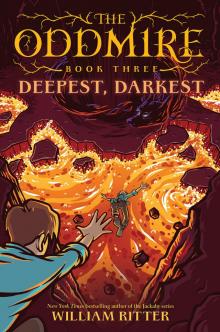 Deepest, Darkest
Deepest, Darkest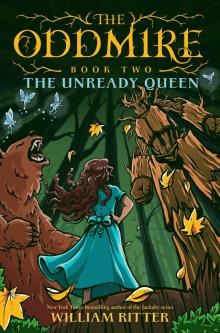 The Unready Queen
The Unready Queen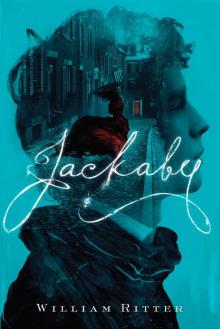 Jackaby
Jackaby Changeling
Changeling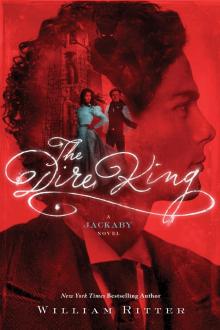 The Dire King
The Dire King Ghostly Echoes
Ghostly Echoes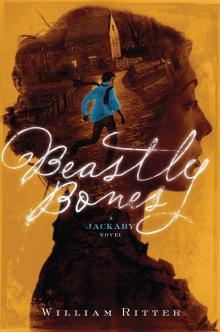 Beastly Bones
Beastly Bones